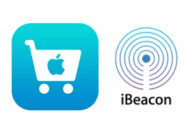
The largest iBeacon retail rollout to date is the one announced earlier this year by American Eagle Outfitters. The company said it will put iBeacons in all 100 stores across the US. However it's not clear where that stands at the moment. Walgreens, Safeway, Alex and Ani and several other retailers have also deployed Bluetooth beacons to varying degrees in their stores.
This morning Hudson's Bay Company said it is joining the club. The retailer, which also owns the Lord & Taylor and Saks Fifth Avenue chains, said it will roll out beacons (with Swirl) in selected stores in Boston and Toronto:
HBC Department Store Group is deploying the Swirl in-store beacon marketing platform to deliver digital experiences to consumers’ smartphones while they shop in the company’s department stores in Canada and the US. Using beacons installed in merchandising areas throughout its stores, Hudson’s Bay and Lord & Taylor will automatically deliver branded content and personalized offers to in-store shoppers through an array of company-owned and third party mobile apps.
The stores will deliver messages via their own mobile apps through Swirl. Though Swirl still has limited visibility among most consumers, it's clear that retailers must pursue a multi-pronged strategy with smartphone shoppers. They need a combination of their own apps and some third party distribution or marketing to build in-store smartphone audiences.
One related development that's very promising for retailers, which generally don't see high app-penetration rates, is the prospect of GPS-enabled mobile browser-based notifications. I wrote about this development earlier today. A company called Roost has developed push notifications for the web and will soon roll them out to mobile browsers.
This would enable retailers (and others) to get users on the PC to opt-in to notifications, which could potentially later be sent to nearby and in-store customers through the browser, even though those users don't have the retailers' apps on their phones. While this isn't yet available it's a potentially big deal for retailers.
My understanding is that BLE beacon signals wouldn't be receivable by these non-app browser users. Nonetheless, browser-based notifications could be used as a "fall back" or alternative way to message in-store consumers for those who don't have the retailers' apps.
Categories: Articles, Mobile + Location

 Opus Research Welcomes Ian Jacobs as VP and Lead Analyst
Opus Research Welcomes Ian Jacobs as VP and Lead Analyst  United Airlines, TXU Energy, and Memorial Hermann Among Opus Research’s 2024 Conversational AI Award Winners
United Airlines, TXU Energy, and Memorial Hermann Among Opus Research’s 2024 Conversational AI Award Winners  Views from the NICE Analyst Summit: Introducing the Experience Continuum
Views from the NICE Analyst Summit: Introducing the Experience Continuum  Opus Research Announces 2023 Conversational AI Award Winners
Opus Research Announces 2023 Conversational AI Award Winners